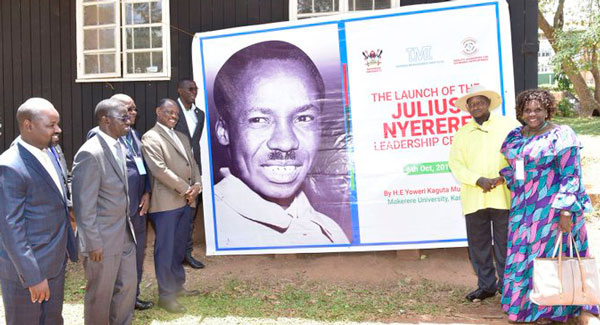
Tanzanian politician says Nyerere himself would have protested anyone calling him a saint. “What we should do, and make sure we do, is to humanize Mwalimu Nyerere.”
Kampala, Uganda | THE INDEPENDENT & URN | Renowned Tanzanian opposition politician Tundu Antiphas Mughwai Lissu says Mwalimu Julius Nyerere should never be canonized, because he was ‘never a saint’.
Popularly known as Tundu Lissu, the two-time member of Tanzania’s Parliament and opposition chief whip on Thursday surprised law students and scholars at Makerere, when he openly accused Mwalimu Nyerere of human rights violations and abuse of power.
He was delivering a talk at a dialogue on Mwalimu’s influence and legacy on the constitutional and political development of Uganda and Tanzania, at Makerere University’s school of law (FULL VIDEO ). It was organized by KAS Uganda and Sundan, the school of law, and Konrad Adenauer Stiftung.
“I am saying we should humanize him. He never was a saint. He would be the first to admit that he never had anything to do with religious sainthood,” Tundu Lissu told his audience.
“He was a political leader first and foremost. These attempts to put him on religious pedestal…. They are doing it because the great man is dead. He would have protested.”
Tundu Lissu argued that Mwalimu Nyerere never categorized himself as a religious leader. “Why are they trying to make him one? He was a Catholic, I’m a Catholic too. I’m not sure that Mwalimu was not sinful. I don’t think he wasn’t. He was a human being.”
“The attempts to canonize him, whether as a secular saint or religious one, are attempts to dehumanize Mwalimu. What we should do, and make sure we do, is to humanize Mwalimu Nyerere.”
Julius Kambarage Nyerere was the first President of Tanzania. He ruled the country for 24 years before retiring in 1985 and is best remembered by Ugandans for sending troops to liberate the country from dictator Idi Amin in 1979.
Since he died on 14th October 1999, his family members and some Catholics in Tanzania have for the last twenty years been leading a cause for his beatification – one of the first steps to sainthood.

Some of those efforts have been supported by President Yoweri Museveni. Maria Nyerere, the wife to the Tanzanian statesman has been in Uganda several times to participate at the Uganda Martyrs day commemorations.
However, Tundu Lissu says those leading a cause for beatification shouldn’t just be doing it because Nyerere died. He says like many post-colonial leaders, Nyerere’s fingers were equally soiled by blood.
“He committed very fundamental mistakes. There are stories if told, may lead us to ask some of his motives. Because it is always told that the intentions were good. But we should remember that the road to hell is curved with good intentions,” said Tundu Lissu.
Lissu however admitted that he wouldn’t have been allowed to deliver such a lecture at the University of Dar es Salaam where he studied law, and thanked Makerere for allow him to express his views freely.
“While UDSM, my own alma mater, and other universities in Tanzania have become jailhouses for free political thought and debates, Makerere, the great institution of higher learning which counts Mwalimu as perhaps its most illustrious alumnae, has invited me to give a public lecture on his many legacies in contemporary East African constitutional and political orders. Kudos to Makerere for keeping the fire of academic freedom burning!” he said pre-event.
Tundu Lissu chairs CHADEMA (Chama cha Demokrasia na Maendeleo, Party for Democracy and Progress), the largest opposition party in Tanzania. He, like other critics of Mwalimu Julius Nyerere, believe that TANU and later Chama Cha Mapinduzi’s political philosophy advisedly affected Tanzanians and other African nations, including Uganda.
“The way our leaders are behaving today….The unaccountable and criminal behavior on the part of our leaders has everything to do with the constitutional foundations that were laid by Mwalimu in 1962. He created a president who was only accountable to his God. How good could that be? ” he asked.
While Julius Nyerere has been hailed for having united and created a nation in Tanzania out of over 120 tribes, Tundu Lisu instead argues that all Nyerere did was help in creation of a state.
“I’m not very sure whether state is the same thing as the nation. Do we still have our 120 tribes? We were not fighting ourselves during the 80 years while we were under colonialism. We have not fought ourselves in the 64 years that we have been independent,” he said
“The post-colonial stability in Tanzania originates from German colonialism. In Mwalimu’s state, if you examine it closely, you see a striking continuity between the colonial state and the post-colonial state,” he added.
He observed that the hallmark of the colonial state was its violent oppressive character, characterized by a regime of right-less law.
“Characterized by state orchestrated violence of the instruments of violence of the colonial state. The police, the army, the prisons, the courts. How do they differ from today’s governments, whether in Uganda or Tanzania?”
He argues that the one thing that unites post-colonial leaders in Africa is their authoritarianism.
“What they have in common is the oppression of their people. Under Mwalimu Nyerere, possibly hundreds or thousands were detained without trial,” he noted.
Tundu Lissu revealed that even the British Colonial state in all its oppressiveness, never had preventive detention laws.
“Mwalimu borrowed it from Ghana’s Nkurumah. Because the preventive detention law was enacted by Kwame Nkrumah in 1960.”
Speaking about Mwalimu Nyerere’s foreign policy influence on Uganda, Tundu Lissu says he at some moment acted like a kingmaker determining who should rule Uganda especially after President Idi Amin had been defeated by the Tanzanian forces and Ugandan exiles of UNLF in 1979.
He argues that President Museveni has adopted most of Mwalimu Julius Nyerere’s leadership style.
“ In Museveni’s own statements, he looks at Mwalimu like his political father figure. Which is fine, but where has Museveni left the great notes of Mwalimu the great leader ?”
***
RELATED STORIES
 The Independent Uganda: You get the Truth we Pay the Price
The Independent Uganda: You get the Truth we Pay the Price



